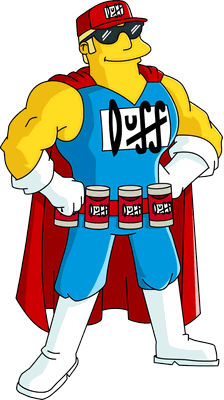Three of The Most Famous Fictional Brands
Table Of Contents
Fact Vs Fiction
With the release of Disney+ and Apple TV+, more and more televised content is being made accessible to the masses. From the comfort of their homes, people can watch old classic films and new original content. With more content comes new characters, universes...and brands. While many studios will opt to use real brands in their productions, others have decided to create completely new fictional brands to work with. The rising popularity of media franchises has allowed these fictional brands to appear in more than just one appearance in multiple films/episodes, becoming ingrained in modern pop culture.
At Hollywood Branded, we help real brands gain exposure through entertainment media, but we have to give props to how well known these brands are, especially because they aren’t real! In this blog, Hollywood Branded takes a look at three of the most famous fictional brands that have appeared in pop culture.

Why Go Through The Trouble?
Fictional brands aren’t exactly new and can actually be found in all forms of media ranging from music to books and even paintings. in the past few years they have started to pop up more often, particularly in film and television. So why would producers go through the trouble of designing and creating an entirely new brand when plenty of real brands would happily lend their products to be featured? There's a lot of reasons so let’s take a look at a few examples.
Stark Industries
With Avengers: Endgame recently becoming the highest grossing film of all time, you might find it hard to find anyone who doesn’t know the name Tony Stark aka Iron-Man. Although he made his first appearance on the cover of the comic book Tales of Suspense #39 in 1963, it was his silver screen debut in 2008’s Iron Man that thrust the character into the spotlight. In the following decade, Robert Downey Jr.’s portrayal of the genius, billionaire, playboy, philanthropist made 9 additional appearances across the Marvel Cinematic Universe and each time he shows up, audiences are reminded of his company, Stark Industries.
Before Tony Stark donned the Iron Man suit, he attained billionaire status by selling weapons through Stark Industries. So why did Marvel decide to come up with their own weapons company instead of using a real life one? Well, Stark Industries plays an important role in the backstory of Tony Stark as it gives realism to the idea of him being as wealthy as he is. If Marvel chose a real company to pair with the fictitious character, it might take the audience out of that universe as we know it just isn’t true, but creating the fictitious company associated with Tony Stark creates an extremely immersive and believable world. It wouldn't make sense if the arrogant personality of the character didn’t name his company after himself. This isn’t to say that Marvel didn’t take inspiration from real weapons companies, as the logo for Stark Industries has similarities with defense companies Lockheed Martin and Northrop Grumman.

Pizza Planet
Here’s a few things that you can expect to see in every Toy Story movie: Buzz Lightyear, Woody, and Pizza Planet. Although the first two are the central characters of the franchise and appear in almost every scene, the third makes its appearance much more subtly in the background. Pizza Planet is a fictitious fast food franchise that appears most prominently in Toy Story while making subtle cameos as a truck in almost every other Pixar films as well. In its first appearance, Buzz and Woody venture inside Pizza Planet to find their owner, Andy. During this extended scene, the Pizza Planet logo can be seen prominently as the toys maneuver through the Chuck E. Cheese inspired arcade.

In almost every Disney store you go into, you can probably find at least three different merchandise embroidered with the Pizza Planet logo. That’s the beauty of creating your own brand! While the creators obviously took inspiration from real life pizza franchises such as Domino’s or Pizza Hut, creating their own brand, with similar likeness to the original, allows Pixar to create clothes, toys, key-chains and more as if Pizza Planet was a real franchise. There’s even a Pizza Planet inspired restaurant at Disneyland!
Duff Beer
What comes to mind when you hear “America’s favorite TV family”? Sure there are a lot of them out there, from the Brady Bunch to the Cosbys, but none of them have stood against the test of time quite as well as The Simpsons.
The Simpsons holds the award in the Guinness book of world records for the longest running sitcom and for good reason. Its family friendly mood mixed with its subtle adult comments has made it a show that appeals to people of all ages. The animated nature of the show allows for an exaggerated version of the real world which includes fictional brands that are essentially a parody of their real world counterparts. The Kwik-E-Mart appears in multiple episodes as a convenience store that bears striking similarities to Seven Eleven while Krusty Burger is a fast food restaurant that is a clear imitation of McDonald’s.
However, no brand in the Simpsons universe is as famous as Duff Beer. Having appeared in some form in almost every episode, Duff Beer has become widely recognized among both fans and people who have never seen the show. Its recurring appearance is no doubt credited to Homer’s alcoholism, which is a major plot device in several episodes in addition to being a key trait in Homer’s character.

While it’s no surprise that Simpson’s creator, Matt Groening, didn’t use a real alcohol brand instead of Duff, given that part of the show’s comedy is centered on parodying real brands, there are an assortment of other reasons why he might have chosen to do this.
First, it gives him the freedom to do whatever he wants with the brand in the context of the story. A real brand, like Heineken, might put restrictions on how their brand is allowed to be portrayed which would have hindered not only Homer’s character, but also the story of several episodes. Duff Beer is depicted in a negative light several times throughout the show's 31 seasons being the primary culprit in Homer’s criminal and idiotic activities. Furthermore, Duff’s fictional owner, Howard K. Duff, is portrayed as a ruthless and evil businessman, something that would likely have not been permitted by a real life individual.

Second, Duff’s fictional background allows the show to continually add to it whenever the story calls for it. The best example of this is with the character of Duff Man.
Duff Man is the mascot of the Duff corporation and plays a key character in many episodes whilst also cameoing in an assortment of other episodes. He is the personification of Duff Beer in the show and he can be altered at the show-runner's whim to fit as the Duff corporation is completely fictional.
A Pastiche Of The Real World
Ultimately, creating their own fictional brand gives the creator the freedom to use it in any way that they so desire. Taking inspiration from real life brands, as almost a parody or homage, gives realism to the fictional world with enough similarity to the real world that the audience will acknowledge it as such.
While there are a great deal of benefits that come with using a fictional brand, there are even more that come with using a real brand. If you want to learn more about the incredible things that using a real brand in entertainment can bring you take a look at some of these links below!
- Product Placement Versus Brand Integration Explained
- Top Brand Partnerships With Avengers: Endgame
- The Magical Harry Potter Brand Partnerships [Infographic]
- Brand Partnerships In Marvel’s Spiderman: Far From Home
- Top Brand Partnerships With Bohemian Rhapsody
If you're ready to make your product as popular as these three, check out this link!








